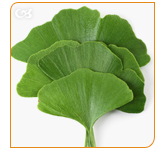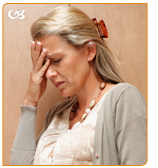Can Ginkgo Biloba Boost My Concentration Levels During Menopause?
Hot flashes, mood swings, anxiety — when you’re suffering the ill effects of menopause, it’s no small wonder that you’re finding it hard to focus. But help is on the way, and it’s right where you’d least expect it, the supplement aisle of your local grocery store.
 But this is no miracle cure. Ginkgo biloba, known to much of the world as just ginkgo, has been used in Chinese and Japanese medicine for centuries. Today, the herb is often recommended by doctors for its reported ability to boost mental performance and concentration, no small blessing to women suffering memory loss and an inability to focus during menopause. What’s more, the herb has an added bonus for menopausal women. Keep reading to find out more.
But this is no miracle cure. Ginkgo biloba, known to much of the world as just ginkgo, has been used in Chinese and Japanese medicine for centuries. Today, the herb is often recommended by doctors for its reported ability to boost mental performance and concentration, no small blessing to women suffering memory loss and an inability to focus during menopause. What’s more, the herb has an added bonus for menopausal women. Keep reading to find out more.
Ginkgo Biloba: An Overview
Native to the highlands of Japan, ginkgo biloba was brought to mainland Asia centuries ago and quickly spread throughout the continent, to be used by generations in boosting mental clarity. It was only recently, however, that the herb was introduced to the West. It can now be found in most supplement aisles, and is marketed for its ability to improve mental performance.
How Can This Herb Help During Menopause?
 Women going through menopause often report the loss of memory and concentration. Ginkgo biloba is reported to boost both. The herb contains an additional bonus called phytoestrogens. These plant compounds are thought to replace estrogen in the body, thus correcting hormonal imbalance during menopause. Since these imbalances are the source of menopausal symptoms like memory loss, phytoestrogens are thought to help treat these ill effects.
Women going through menopause often report the loss of memory and concentration. Ginkgo biloba is reported to boost both. The herb contains an additional bonus called phytoestrogens. These plant compounds are thought to replace estrogen in the body, thus correcting hormonal imbalance during menopause. Since these imbalances are the source of menopausal symptoms like memory loss, phytoestrogens are thought to help treat these ill effects.
Are There Side Effects?
Too little is known about ginkgo biloba to directly trace any side effects to it. That said, some studies have linked a high consumption of phytoestrogens to an increased risk of breast cancer. These studies have not been verified, but women should be aware of them.
Women concerned about the possible side effects of phytoestrogens can look to several alternatives. Non-estrogenic herbs have been known to boost the body’s natural production of hormones, without any known side effects. Of course, eating right and exercising more are always good ways to fight menopausal symptoms. They’re free, as well. Women should only turn to drugs and surgery as a last resort. Talk to a doctor if you feel these treatment options are right for you.
Click the following link to learn more about ginkgo biloba for menopause.



























